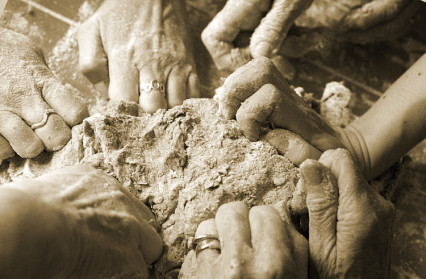Elin Williams reviews Bara Bread by Carmen Medway-Stephens, a charming play with likeable characters and a relatable story.
Baking bread the traditional way is a pastime few working woman are able to indulge in these days. Bread making machines offer a faster and less messy way of baking your own loaf, but it cuts out the essential process, a process which requires determination and patience.
The decline of older, familiar ways permeates Carmen Medway-Stephens’ script for Bara Bread. Busy working woman Nettie returns to the small village of Lovenny in order to sell the house where she grew up after her mother’s death. With the kitchen table as her ‘universe’ and her mother’s ashes and baking manual left behind, Nettie re-connects with her former self, setting all her sights on baking the perfect loaf of bread.
There are hints of magical realism where Nettie adds her mother’s ashes to the ‘mother dough’, a fermentation starter when making bread, in a symbolic gesture. After several failed attempts at the perfect loaf, Nettie decides (with the help of her mother’s wisdom left behind in the baking manual) to invite characters from the little village to a baking night where she will hopefully achieve her goal. Over wine and confessions, the women bake together, venting frustration at their modern day problems and ‘telling it to the dough’.
The script is a light-hearted reflection on the changing world around us and a longing to return to simpler times. At first glance, the characters may appear to be stock type, but as the production develops they flesh out and provide convincing reasoning behind their actions. Saran Morgan plays the teenage mother Lara exceptionally well; believable and endearing. The script is genuinely funny with an underlying tone of sadness as a comment on this loss of tradition and the death of a maternal figure.
On this particular night of the production, the play took place in the small Tabernacle in the middle of Talgarth. As a venue, the space inside the Tabernacle was ideal for this piece. The intimacy allowed the audience to feel as if they were in the kitchen with the characters and privy to their trials and tribulations. The women in Bara Bread may struggle with their modern day lives and its problems, but it is this reverting back to the old which appears to rejuvenate them and help them feel optimistic for their future and the future of Lovenny.
Bara Bread is a charming play with likeable characters and an enjoyable balance between humour and poignancy. Its story is one which resonates with a modern day audience; the loss of tradition and the importance of community and togetherness.
Elin Williams has written a number of reviews for Wales Arts Review.











